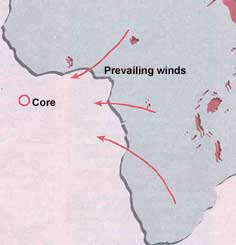Sooty symptoms
Sooty symptoms

in view of a recent discovery, the models used to estimate earth's response to climate change stand for a rethink. While studying the effect of marine life on global warming, scientists found that the role of oceans in carbon fixation had actually been overestimated. The new findings suggest that half of the carbon found in ocean sediments may not have been removed from the atmosphere by marine life but, in fact, came from forests. This shatters the long-held assumption that plankton and other marine organisms play a major role in regulating the amount of carbon dioxide in earth's atmosphere ( New Scientist , Vol 151, No 2047).
In a bid to estimate the effects of global warming, David Verardo and his colleagues at the University of Virginia in Charlottesville, us , decided to explore how the planet dealt with large climate changes in the past. A core of sediment was drilled from the bottom of Atlantic ocean to study the organic matter in it. Preliminary tests revealed that during the ice ages, around 200,000 years ago, the amount of carbon in this part of the ocean increased.
At first, scientists assumed that a proliferation of life in the ocean might have helped pull carbon out of the atmosphere, cooling the planet further. But Verardo and his team decided to confirm this. A technique was developed to analyse the form of carbon present in the sections of the sediment. Scientists were surprised at the form of carbon residue left after breaking down the organic compounds in the sediment using nitric acid. Amazingly, about half of the carbon in the core turned out to be charcoal, a carbon form that could in no way come from marine life.
Scientists traced the origin of this carbon form to charcoal dust from forest fires. As charcoal accounted for as much as 90 per cent of carbon in some of the sections, Verardo concluded that "it is a lot of carbon to be flung off into the deep ocean'. They believe that high winds generated by large temperature gradients created by huge ice sheets, transported an unusual amount of debris and charcoal dust from forest fires far out to sea. Researchers support this preposition by the fact that the sediment was removed from an area where winds blowing off north, central and south Africa converge. This could mean that an unusually large amount of charcoal has been deposited in the area in the region.
Meanwhile, researchers have begun to test whether core samples from elsewhere in the Atlantic contain similar amounts of charcoal. If further studies corroborate these findings, scientists will be forced to redesign the computer simulations currently used to model the response of earth to climate change.







